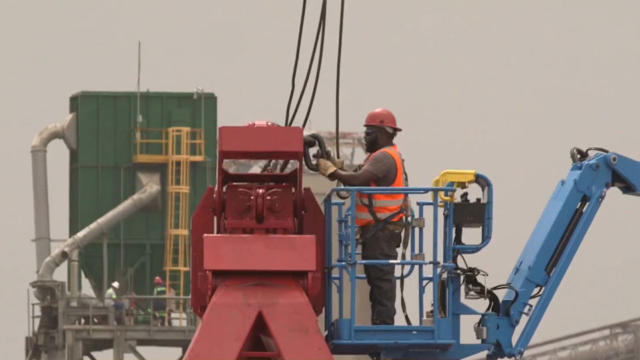One of the U.S. states that could be hardest hit by tariffs is Louisiana.
The U.S. Chamber of Commerce said more than half million jobs there are supported by global trade. Ports along the Mississippi River, as well as businesses that depend on them, could be hurt if the tariffs remain in place for long.
CGTN’s Hendrik Sybrandy reports.
The Port of South Louisiana just west of New Orleans is America’s largest tonnage port. Last year 280 million metric tons of cargo were handled there.
“I like to say that we’re probably one of the most important ports that nobody ever heard of,” said Paul Aucoin, the port’s executive director. He sees storm clouds gathering over a stretch of the Mississippi River where so much of America’s business is done. Tariffs have been imposed. More are threatened. But their effects haven’t been felt here just yet.
“It has caused a lot of uncertainty,” Aucoin said. “Everyone’s a little unsure about what the future holds.”
An hour’s drive away, south of New Orleans, the future has arrived at Elite Energy. U.S. steel tariffs have made the material these workers use to manufacture hydraulic fracturing equipment 25 percent more expensive.
“Yes, we had to raise prices to keep up and make the margins that we need to make,” said Justin Ramirez, Elite Energy’s Vice President of Business Development. “I’m not happy about it. It’s affected us negatively I guess.”
“Certainly I can tell you that it’s created a lot of nervousness,” said Eddy Hayes, a New Orleans international trade lawyer. Hayes thinks Louisiana, with its long import and export history, could be hit hard by U.S. tariffs and other countries’ retaliatory measures.
The Port of South Louisiana ships and receives cargo from more than 90 countries around the world. China is one of the top five import nations. China is also one of the top five commodity destinations.
The U.S. Chamber of Commerce said $5.7 billion worth of Louisiana exports to China are now targeted for retaliation, including grain, crude oil and petrochemicals.
“When you have tariffs and tariffs go into effect and people buy less grain, that’s less tonnage,” Aucoin said. “Less tonnage to us means less jobs. It’s just that simple.”
Thirty-thousand people work for Aucoin’s port or for one of the 67 companies located within the port district. An estimated half million Louisiana jobs are supported by global trade. Aucoin said $23 billion in future job-generating port projects could also be affected as the price of steel goes up.
Steel tariffs have already hurt one food service equipment manufacturer that was in New Orleans for a recent convention.
“We’re just seeing so many barriers, the costs for us to do business,” said Joe Arvin, Corporate Executive Chef with Antunes. “We’re almost getting completely thrown out of the market in Canada.”
Here in Louisiana, which backed President Trump in 2016, there are mixed feelings about the current trade disputes.
“We have a lot of conservative businessmen and women down here in Louisiana,” said Hayes. “We voted heavily for Trump as a community. You see a lot of uneasiness in their facial expressions and in their discussions.”
Some blame China for the current situation. “So I think that’s given them a little bit of a lifeline for now,” said Hayes.
Ramirez, whose company is feeling the pinch, believes the tariffs were imposed too quickly.
“I don’t think it can keep on going too much longer like this but we’ll see,” he said.
Many believe political pressure from places like Louisiana will eventually force the U.S. and its trade partners to hammer out a solution. That’s the hope anyway in this trade-dependent area where the future looks murky at the moment.
“It is like a big cloud hanging over the area and we just want the sun to peek through and make things rosy again,” Aucoin said. “And happy.”
 CGTN America
CGTN America

